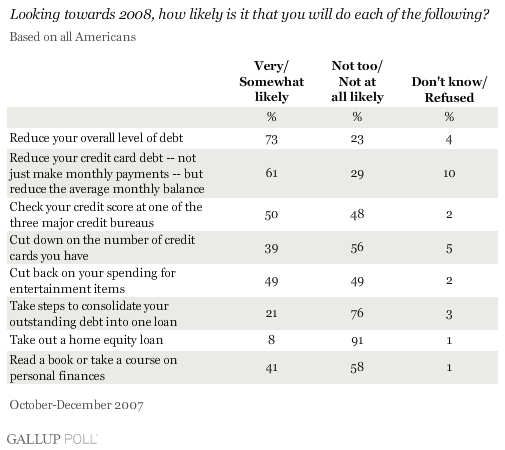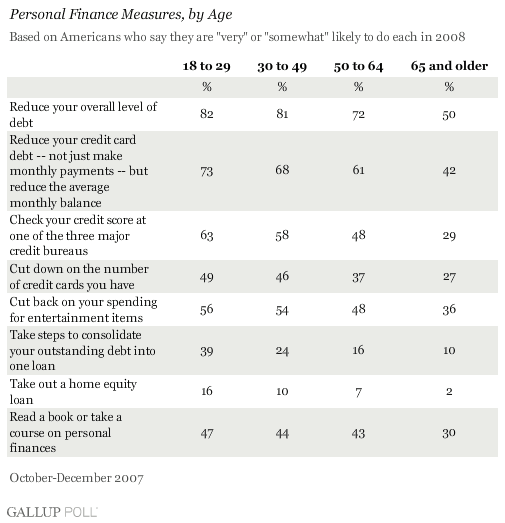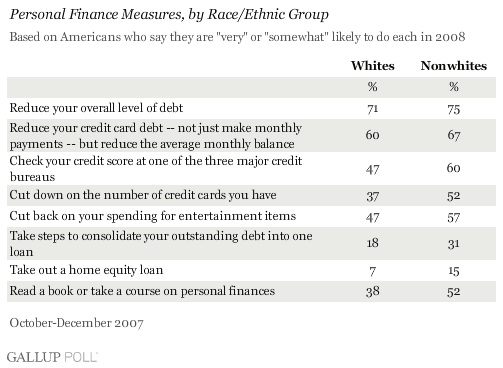WASHINGTON, D.C. -- New Year's resolutions are easy to make but harder to keep, especially when it comes to money matters. The latest Experian/∫⁄¡œÕ¯ poll shows that a majority of U.S. adults begin 2008 planning to tackle their debt burden, and about half plan to check their credit scores and cut back on entertainment expenses. But other aspects of personal finance, such as loan consolidation and credit card management, aren't on most Americans' to-do lists for the new year. Younger adults and nonwhites are especially likely to express a commitment to getting their finances in order in 2008.
What Americans Are Likely (or Unlikely) to Do in 2008
The poll, conducted between October and December 2007, shows that 73% of U.S. adults say they are very (47%) or somewhat (26%) likely to reduce their overall debt level in 2008. A majority of Americans are also interested in taking steps to decrease their credit card debt this year. Sixty-one percent of respondents say they are likely to reduce their credit-card average monthly balance, with 44% saying this is very likely and 17% somewhat likely.
Americans are about equally as likely to say they will check their credit scores at one of the three major credit bureaus this year (50%) as to say they will not (48%). Likewise, Americans are evenly split when asked about the likelihood of reducing their entertainment budgets: 49% plan to cut back on entertainment outlays and an identical percentage say this is unlikely.
Few Americans are keen on borrowing against their home equity or changing the way they manage their overall debt burden. Just 8% say it is likely they will take out a home equity loan in 2008 and 91% say it is unlikely. Loan consolidation is another aspect of personal finance management that most Americans are unlikely to do this year. Twenty-one percent tell ∫⁄¡œÕ¯ they are likely to take steps to consolidate their outstanding debt into one loan, but 76% say this is unlikely.
Americans on average are also unlikely to further educate themselves about personal finances or reduce the number of credit cards in their wallets. Fifty-eight percent of U.S. adults say they are not too (22%) or not at all (36%) likely to read a book or take a course on personal finances. Further, 56% say they are not too (18%) or not at all (38%) likely to reduce the number of credit cards they have.

Who's Going to Do What?
Younger respondents consistently express a greater likelihood of dealing with any of these personal finance items than do older respondents. Eighty-two percent of respondents aged 18 through 29 compared with 50% of those aged 65 and older say it's likely they will reduce their overall level of debt in 2008. With respect to reducing their entertainment budgets, younger respondents (56%) are also far more likely than older ones (36%) to make this a goal this year. Overall, the gap between younger and older respondents ranges from 14 points on the home-equity-loan item to 34 points on the credit-score item.

Nonwhites are also more likely than whites to express interest in putting many of the items tested in the poll on their to-do lists. Fifty-two percent of nonwhites compared with 37% of whites say it's likely they will cut down on the number of credit cards they have. Nonwhites are also more likely than whites to say they will read a book or take a course on personal finances (52% vs. 38%), check their credit scores (60% vs. 47%), consolidate their debt into one loan (31% vs. 18%), and reduce their entertainment budgets (57% vs. 47%).

Bottom Line
Credit and debt management are crucial elements of financial fitness. Overall, the poll results indicate that Americans' top priority in 2008 is to reduce their debt levels. As individuals take concrete steps to reach this goal, more money becomes available to save and invest -- two essential elements in building financial prosperity. However, the goal of debt reduction may remain elusive for many Americans if other measures such as reducing credit-card use or slashing overall spending are left out of their 2008 resolutions.
Survey Methods
Results for the Experian/∫⁄¡œÕ¯ Personal Financial Credit Index poll are based on telephone interviews with 3,057 adults, aged 18 and older, conducted October through December 2007. For results based on the total sample of national adults, one can say with 95% confidence that the maximum margin of sampling error is ¬±2 percentage points. In addition to sampling error, question wording and practical difficulties in conducting surveys can introduce error or bias into the findings of public opinion polls.
